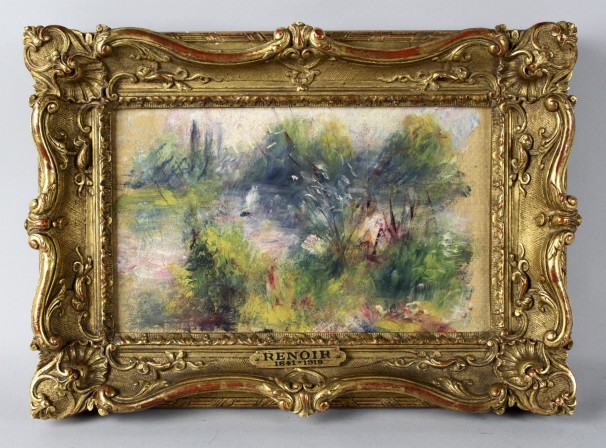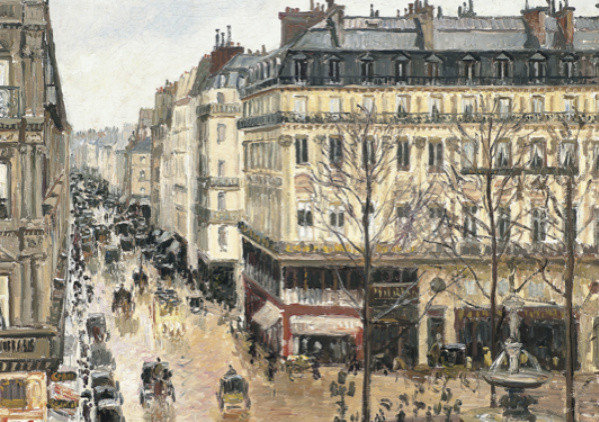From Dresden to Aschbach to Düsseldorf—New Scholarship in U.S. Archives Traces Hildebrand Gurlitt at War’s End, Could Affect Cornelius Gurlitt’s Claim to Good Faith Ownership
The Main Post has an article today (in German) by Christine Jeske tracing the late-war and post-war trajectory of Hildebrand Gurlitt and his now-infamous collection. The article is fascinating, and sheds considerable light on how the collection came through the war and how Gurlitt evaded greater scrutiny that might have revealed the trove’s whereabouts earlier. It also puts into context any claim Cornelius Gurlitt might now have to argue he took possession of the paintings from his father unaware of their provenance—what will be a critical argument, particularly if yesterday’s Cultural Property Restitution Law proposal by Bavaria becomes federal law in German.
Read More
Topics:
Wiesbaden,
Cultural Property Restitution Law,
veschollene Kunst,
Franken,
Franconia,
Hildebrand Gurlitt,
Cornelius Gurlitt,
George Clooney,
Erik Berger,
Augsburg,
Dresden,
Nuremberg,
Fall Gurlitt,
Monuments Men,
Gurlitt Collection,
Karl Haberstock,
Kunstverein,
Entartete Kunst,
Munich,
Heiner Dikreiter,
Beutekunst,
Freiherr Gerhard von Pölnitz,
Bavaria,
Kulturgut-Rückgewähr-Gesetz,
Nürnberg,
Düsseldorf,
Schlüsselfeld,
Monuments Fine Arts and Archives,
Gemäldegalerie Dresden,
Christine Jeske,
Walter Paech,
degenerate art,
Städtische Galerie,
München,
Main Post,
Karl and Magdalene Haberstock Foundation,
Raubkunst,
Verjährung,
Nazi Raubkunst,
Aschbach
As reported yesterday, the government of Bavaria has moved ahead with a proposal to amend the statute of limitations over art claims like those arising out of the Gurlitt find in Schwabing/Munich. The “Draft law for the exclusion of limitations on claims for misappropriated cultural property, particularly from the Nazi era (Cultural Property Restitution Law)” would bar the assertion of a statute of limitations where the current possessor does not hold the property in good faith. The draft is now publicly available, here (albeit in German). The proposal is not limited to Bavaria, rather, it is for consideration by Germany’s federal; parliament in Berlin (first the upper chamber, or Bundesrat, followed by the Bundestag).
Read More
Topics:
Berlin,
Ministerin für Justiz und Kultur,
Cultural Property Restitution Law,
veschollene Kunst,
Schwabinger Kunstfund,
Cornelius Gurlitt,
Gurlitt Task Force,
Fall Gurlitt,
Gurlitt Collection,
Kulturgut,
Entartete Kunst,
Declaration of the Federal Government the Länder a,
Munich,
Beutekunst,
Schwabing,
Bundestag,
Bundesrat,
Bavaria,
Kulturgut-Rückgewähr-Gesetz,
degenerate art,
Freistaat Bayern,
Justizminister,
München,
Raubkunst,
Verjährung,
Winfried Bausback
Die Welt reports today that a scheduled cabinet meeting of the government of Bavaria includes discussion of a draft revision to the state’s statute of limitations. Justice Minister Winfried Bausback (CSU) has apparently stated his desire to ensure that claimants like those heirs to owners of works found in Cornelius Gurlitt’s apartment will not be barred by the statute of limitations, following through on statements he made last year after being selected. There has been lively discussion of whether such claims would be time barred, but this revision would presumably be intended to answer the question broadly. It could signal the beginning of legislative steps to address the situation. The previous Justice and Culture Minister Beate Merk had come under heavy criticism, but a new minister may have room to make some changes. And, in a parliamentary system, the consensus of the ruling government is more significant in anticipating the passage of legislation.
Read More
Topics:
Ministerin für Justiz und Kultur,
Legal Tribune,
veschollene Kunst,
Beate Merk,
Cornelius Gurlitt,
Augsburg,
Schwabinger Kunstfund. Kunstfund München,
Gurlitt Task Force,
Germany,
Fall Gurlitt,
Gurlitt Collection,
Die Welt,
Lorenz Kähler,
CSU,
Hildebrand Gurlit,
Entartete Kunst,
Ingeborg Berggreen-Merkel,
Beutekunst,
Magdeburg,
Gurlitt,
Bavaria,
degenerate art,
Freistaat Bayern,
Justizminister,
www.lostart.de,
Nazi art,
Raubkunst,
Verjährung,
Winfried Bausback

The last remaining claimants for the 1879 painting by Pierre Auguste Renoir, Paysage bords de Seine that surfaced in the possession of a woman who claimed to have found it at a flea market, have filed summary judgment papers seeking final disposition of the case without need of a trial. The Baltimore Museum of Art has made its case that the painting was stolen from the museum in 1951, while Martha Fuqua alleges that she purchased it in good faith at a Virginia flea market in 2009 before attempting to sell it at the Potomack Company. The U.S. government seized the painting from the auction house and filed an interpleader action to determine the true owner; the other principle claimant (Fireman’s Fund Insurance) dropped out of the case last fall without explanation, apparently pursuant to an assignment. Heirs of the original donor to the BMA never responded or made claim to the painting. The case will now turn at summary judgment on the hearsay rule, a topic that have bedeviled generations of law students and lawyers.
Read More
Topics:
hearsay,
authentication,
Pierre-Auguste Renoir,
Potomack Company,
flea market Renoir,
ancient documents,
Gurlitt,
Martha Fuqua,
Baltimore Museum of Art,
Litigation,
business records exception,
summary judgment,
Museums,
Paysage Bords de Seine,
FRCP 56
Read More
Topics:
Chapter 9,
11 U.S.C. § 904,
Judge Rhodes,
Christie's,
valuation,
Appraisal,
Detroit,
Detroit Institute of Arts,
Bankruptcy,
Detroit Emergency Manager,
Kevyn Orr,
Detroit Free Press,
eligibility,
Detroit Bankruptcy
After Judge Rhodes of the Bankruptcy Court for the Eastern District of Michigan ruled on December 3, 2013 that the city of Detroit is eligible for Chapter 9 Bankruptcy protection, the city immediately divulged that the report commissioned by the city from Christie’s to appraise the Detroit Institute of Arts (DIA) collection was nearly finished. On the day of the eligibility ruling, Emergency Manager Kevyn Orr and Christie’s announced some tentative conclusions from the report, namely, that the 2,781 works appraised (roughly 5% of the total collection) had a value of approximately $452 million to $866 million. This was considerably lower than many had speculated.
Read More
Topics:
Old Master,
Mark Stryker,
Chapter 9,
Scheme for Decoration of Sistine Chapel Ceiling,
11 U.S.C. § 904,
Impressionism,
Amedeo Modigliani,
Michelangelo,
Judge Rhodes,
Christie's,
valuation,
Appraisal,
Modernist Art,
Detroit,
Eugene Driker,
Detroit Institute of Arts,
Bankruptcy,
Gerald Rosen,
Detroit Emergency Manager,
Kevyn Orr,
Detroit Free Press,
eligibility,
Detroit Bankruptcy
Since the Court of Appeals’ decision in William J. Jenack Estate Appraisers and Auctioneers, Inc. v. Albert Rabizadeh was released on Tuesday (a decision that the New York Times noted was “first reported by the Art Law Report blog”), reactions have started to come in to the decision. Somewhat surprisingly, they have thus far been relatively few in number. On the whole, few seem exercised about the decision, and no one is gloating, probably because it restores the age-old status quo to which everyone had become accustomed.
Read More
Topics:
Legislation,
consignment,
New York General Obligations Law § 5-701(a)(6),
Appellate Division,
Auctions,
New York Court of Appeals,
Ivan Petrovich Khlebnikov,
agency,
Inc. v. Albert Rabizadeh,
New York Supreme Court,
Hicks v. Whitmore,
Morris Cohon & Co. v. Russell,
disclosure,
Statute of Frauds,
anonymous seller,
identity,
auction,
William J. Jenack Estate Appraisers and Auctioneer
The New York Court of Appeals reversed this morning the decision in Jenack v. Rabidazeh last fall by the Appellate Division of the New York Supreme Court that had held that an auctioneer must disclose the name of the actual owner who has consigned the work, to enforce that sale consistent with the state’s Statute of Frauds. The court concluded that “there exists sufficient documentation of a statutorily adequate writing” such that the Statute of Frauds was satisfied and the agreement is enforceable against Albert Rabizadeh, the winning auction bidder. The result is a sensible one both for stability in the market—the most important jurisdiction in the United States for that—as well as for anyone concerned about provenance and smuggling, as counterintuitive as that might initially appear. The decision is William J. Jenack Estate Appraisers and Auctioneers, Inc. v. Albert Rabizadeh (still unpublished).
Read More
Topics:
Legislation,
consignment,
New York General Obligations Law § 5-701(a)(6),
Appellate Division,
Auctions,
New York Court of Appeals,
Ivan Petrovich Khlebnikov,
agency,
Inc. v. Albert Rabizadeh,
New York Supreme Court,
Hicks v. Whitmore,
Morris Cohon & Co. v. Russell,
disclosure,
Statute of Frauds,
anonymous seller,
identity,
auction,
William J. Jenack Estate Appraisers and Auctioneer
The U.S. Court of Appeals for the 9th Circuit restored last week claims by heirs of Lilly Cassirer against the Thyssen-Bornemisza Collection for the return of the Camille Pissarro painting Rue St. Honoré, après-midi, êffet de pluie.
Read More
Topics:
Nuremberg laws,
Schwabinger Kunstfund,
Cornelius Gurlitt,
Lilly Cassirer,
California Code of Civil Procedure § 338(c),
Dorothy Nelson,
Thyssen-Bornemisza Collection,
Julius Schoeps,
Rue St. Honoré après-midi êffet de pluie,
Claude Cassirer,
Von Saher v. Norton Simon,
de Csepel,
Jacques Goudstikker,
California Code of Civil Procedure § 354.3,
Gurlitt Collection,
Foreign Sovereign Immunities Act,
Hans Sachs,
Von Saher v. Norton Simon Museum of Art at Pasaden,
Madame Soler,
Bundesgerichtshof,
Hildebrand Gurlit,
Entartete Kunst,
Hans-Heinrich Thyssen-Bornemisza,
Hungarian National Gallery,
Nazis,
Munich,
Deutches Historisches Museum,
FSIA,
Preemption,
Gurlitt,
Harry Pregerson,
Restitution,
field preemption,
Marei Von Saher,
Herzog collection,
Bavaria,
Claudia Seger-Thomschitz,
Looted Art,
World War II,
Foreign Sovereign Immunities,
Pinakothek der Moderne,
degenerate art,
Altmann v. Republic of Austria,
578 F.3d 1016,
Freistaat Bayern,
beschlagnahmte Kunst,
Camille Pissarro,
Kim McLane Wardlaw,
Nürnberger Gesetze,
Raubkunst,
Museum of Fine Arts Boston,
Cassirer v. Thyssen-Bornemisza Collection,
verschollene Kunst,
Kunstfund München




